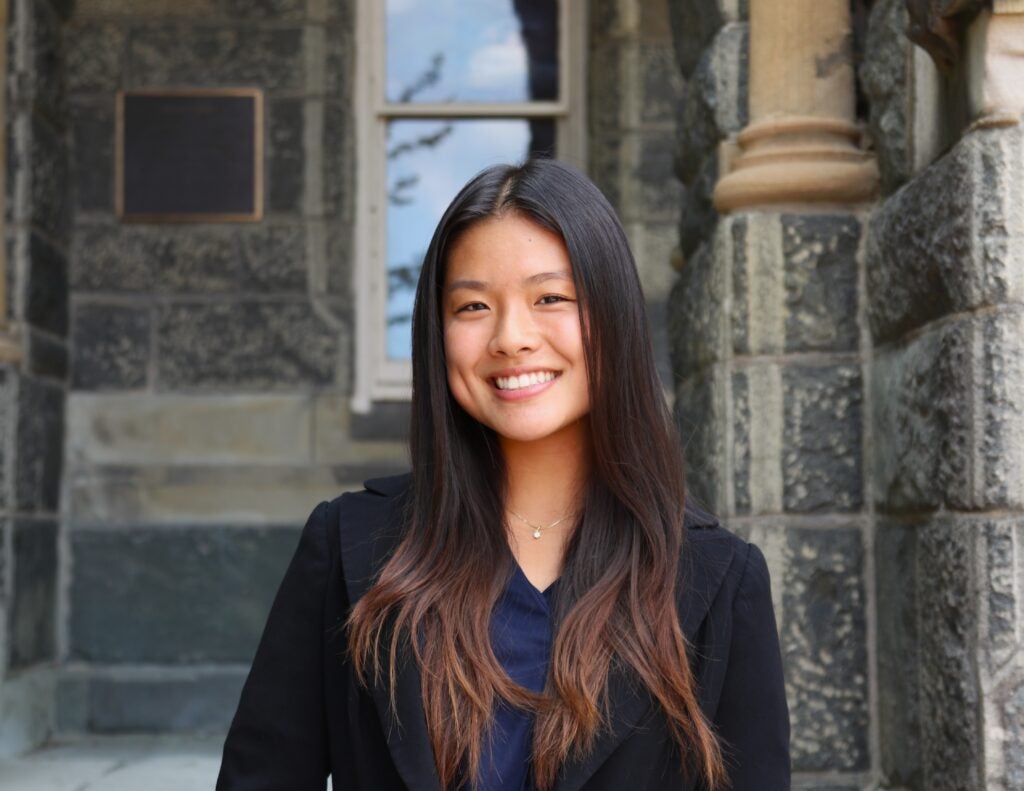Leah Chen: From Physics to Public Health, Bridging Science and Global Health at Georgetown
Posted in ISM Stories News Story

When Leah Chen (C’25) first arrived at Georgetown, she wasted no time jumping into research. “First or second week of freshman year, I was emailing the head of the physics department about research opportunities, and then immediately got involved in the Van Keuren lab,” she recalled.
Exploring Nanoparticles and Kidney Health
That first step launched a four-year journey in Professor Edward Van Keuren’s lab, where Chen studied how a nanoparticle called APP-103 could help treat acute kidney injury (AKI). “What I’ve been looking at is the reaction mechanism behind APP-103,” she explained, “Basically, the active ingredient is called PVAX…which decreases the amount of AKI-causing reactive oxygen species and… releases the anti-inflammatory called vanillyl alcohol. So it’s kind of treating it from two angles.”
Learning Advanced Research Tools
To better understand how APP-103 would work in the body, Chen turned to advanced lab tools at ISM. “I’ve been in the ISM using a machine called isothermal titration calorimetry. And that is looking at the thermodynamics of the reaction,” she said. “I actually started using LC-MS as well, which is liquid chromatography mass spectrometry… to ensure that from the reaction, vanilla alcohol actually is coming out of it. So that was interesting as well, because I’ve learned about that technique in other classes, and to be able to apply it in a physics context was really cool.”
Her years in the lab required persistence and adaptability. “This is my first wet lab experience ever… it was difficult because isothermal titration calorimetry is usually used in a biology context, which is what makes this novel,” she explained. “It’s been a lot of troubleshooting, like trying to adapt this apparatus to particles that it hasn’t really been used for in the past. I probably spent like two years troubleshooting.”
Mentorship and Collaboration
Throughout her time at Georgetown, Chen embraced research as a collaborative process. “One of my strongest mentors was Eleni Hughes… she was a great resource,” Chen said. “I collaborated a ton with Chemistry as well. Being able to lean on the other science departments has made the research process so much smoother.”
Expanding into Public Health
Beyond the lab, Chen’s interests expanded toward global public health. “I have a public health minor as well. I’m interested in health disparities, specifically in women’s health and migrant health,” she said. Her sophomore-year literature review on postpartum disparities was published this May, and she spent last summer in Northern Thailand studying barriers to cervical cancer screening in migrant women. “That was an incredible experience, to be able to see cervical cancer screening in a totally different context. It also kind of got the gears turning in terms of me wanting to go abroad.”
Next Stop: Fulbright in the Netherlands
That momentum is carrying her forward into her next chapter as a Fulbright Scholar in the Netherlands. “I will be doing a study program through Fulbright, where I am pursuing my Master’s of Public Health at Vrije Universiteit in Amsterdam,” she shared. “My goal going into the Netherlands is just to meet new people and really take advantage of the cultural exchange that Fulbright is all about.”
For Chen, Fulbright represents both opportunity and exchange. “It’s challenging a lot of the preconceptions that I have of the United States from of being educated in the US my whole life,” she said. “To me, it’s an opportunity to… expand my ways of thinking and be able to take that back to the US and enrich the communities that I’ll be a part of with a new global perspective.”
Advice for Future Researchers
Looking back at her Georgetown journey, Chen offers one piece of advice to students seeking research and academic opportunities: “Seriously, do not be afraid to reach out. I think most, if not all, of my opportunities were because I reached out to mentors, professors, and friends. The research involvements and communities that I’ve found as a result have become such a core part of my Georgetown experience.”
